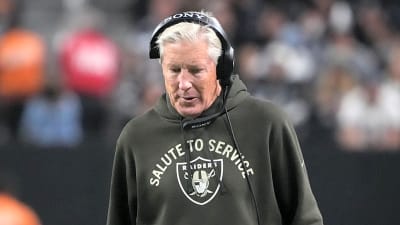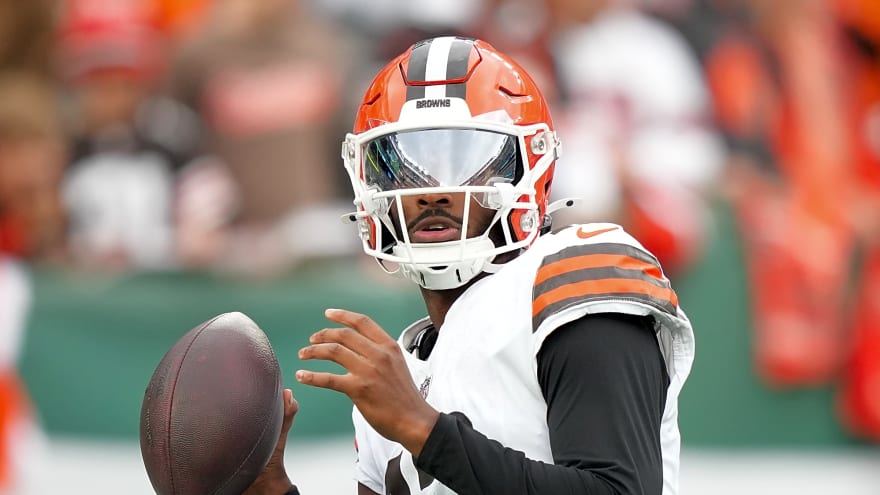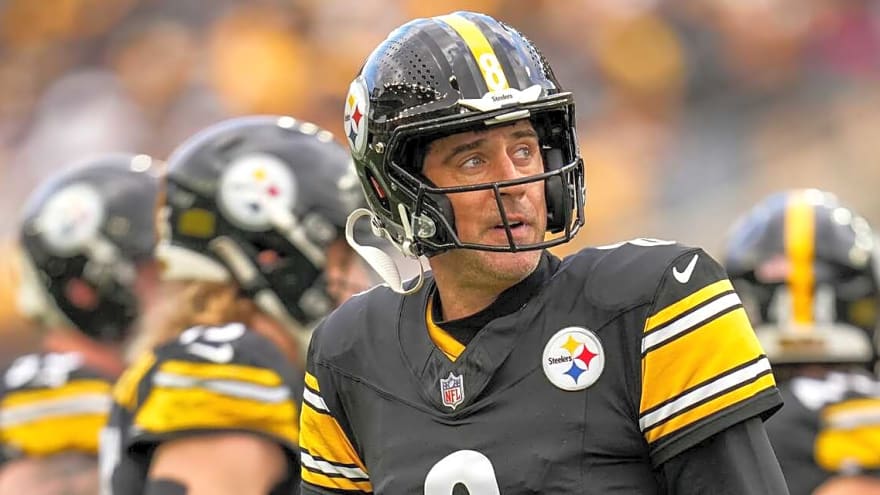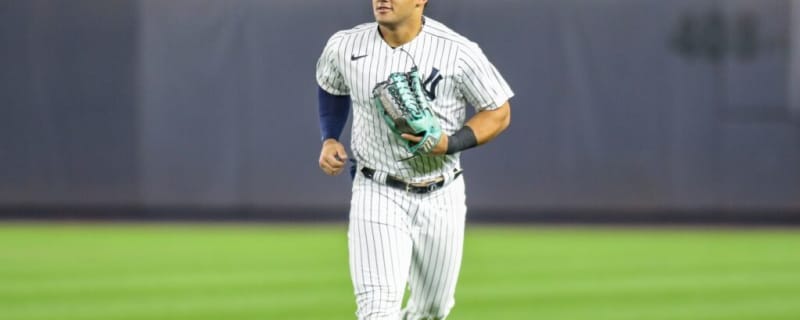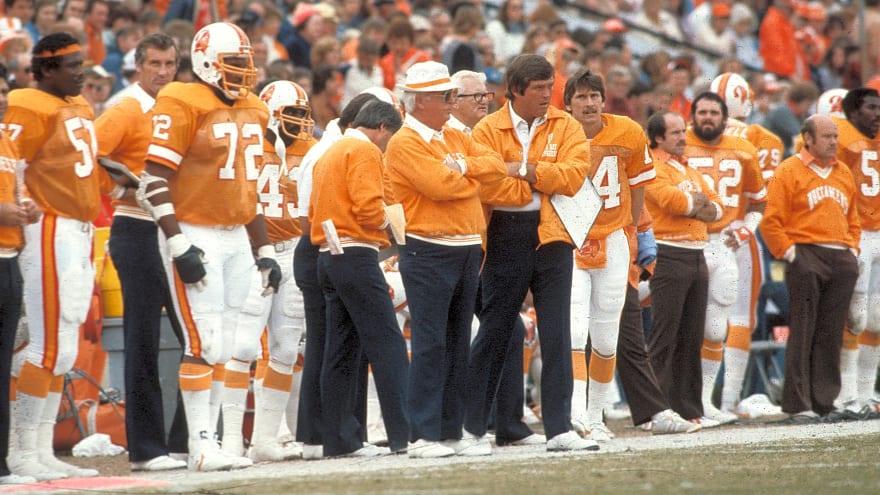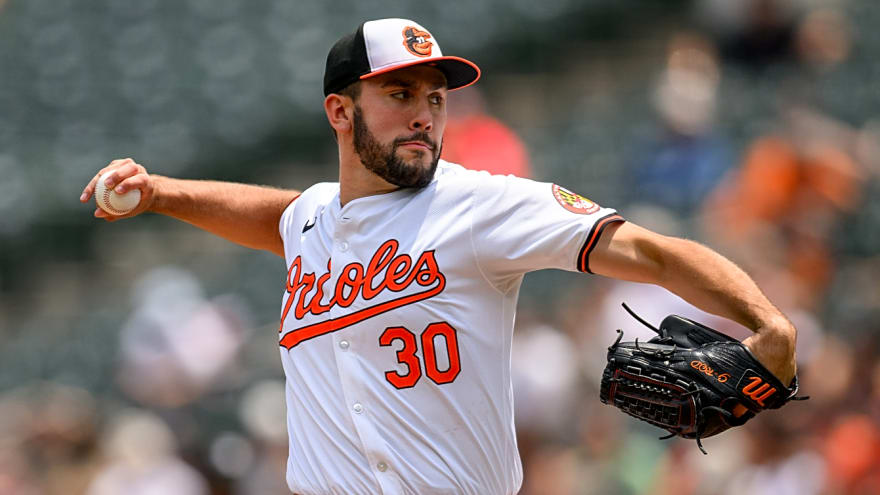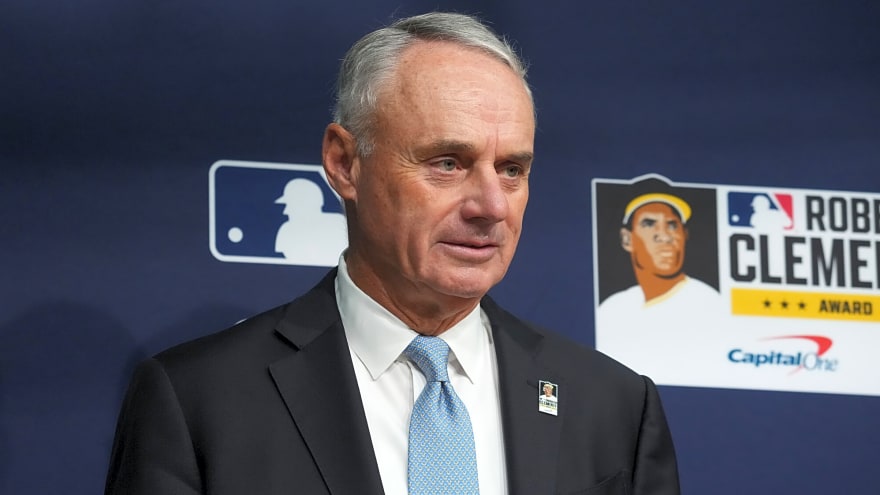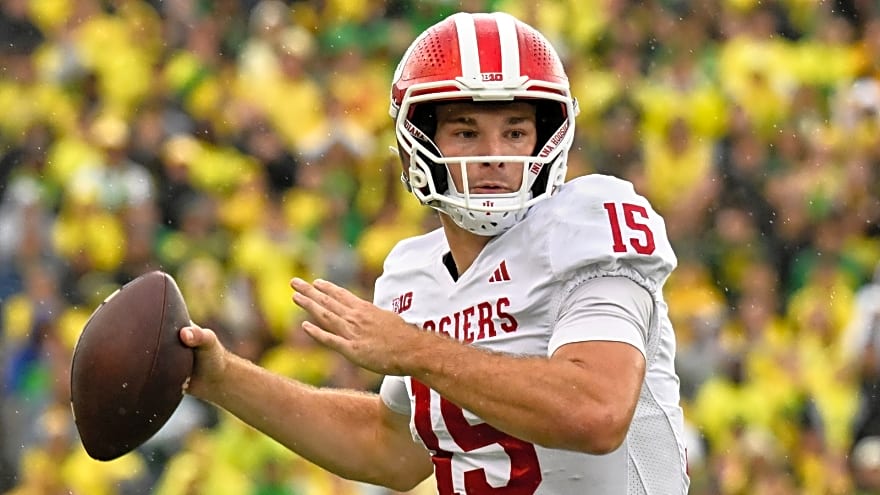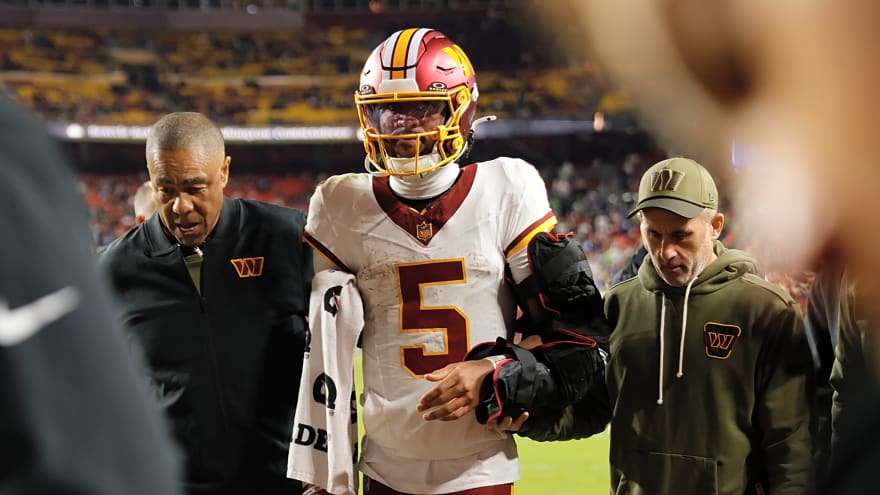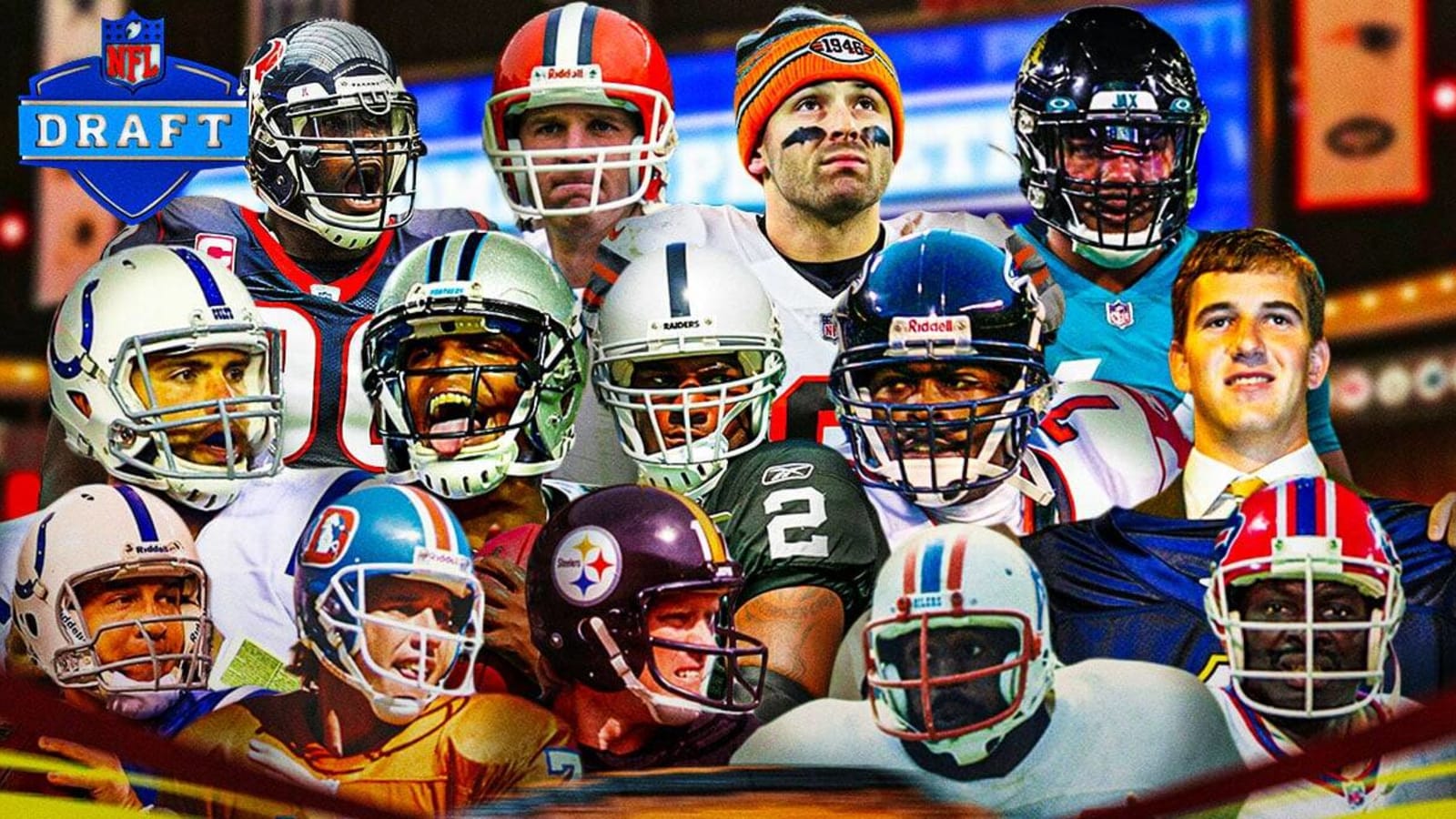
The 2025 NFL Draft is right around the corner, but it isn’t yet set in stone who will go first overall. The Tennessee Titans have the number one pick, and they’ve turned over every stone leading up to what will be one of the most important decisions in franchise history. At one point, reports suggested that they’d consider a trade down, but now the team is seemingly settling on Miami quarterback Cam Ward as their guy. Fellow quarterback Shedeur Sanders also has a case for the number one pick, as do Abdul Carter and Travis Hunter.
Making the right or wrong choice with the top pick in the NFL Draft can make or break a franchise. Just last year, the Chicago Bears were afforded the luxury of selecting a generational talent in Caleb Williams. Although Williams didn’t quite live up to expectations as a rookie, he still has sky-high potential and is expected to become one of the best signal-callers in the league.
Every draft class is different. Six quarterbacks went in the first round last year, but the 2025 class is viewed as weak at the most important position in football. However, there is tons of talent at running back, receiver, offensive line, and at the edge rusher position this year. The common draft era encompasses every NFL Draft since 1967, and since that time, there have obviously been some massive hits and some huge busts in the draft. Every first overall draftee since 1967 will be ranked in this article.
Of course, players who were recently taken with the first overall pick are at a disadvantage, as they still have long careers ahead of themselves. We can’t predict the future, though, so this list will have more of an emphasis on what players have accomplished in their careers to date rather than what they are expected to produce in the future, although career trajectory will be taken into account for younger players.
A player like Joe Burrow is well on his way to ranking high on this list, but with only five seasons to his name, two of which were filled with injuries, he will rank relatively low. He will, however, rank higher than other players drafted recently who haven’t shown as much promise on the football field.
58. JaMarcus Russell, QB: Oakland Raiders, 2007
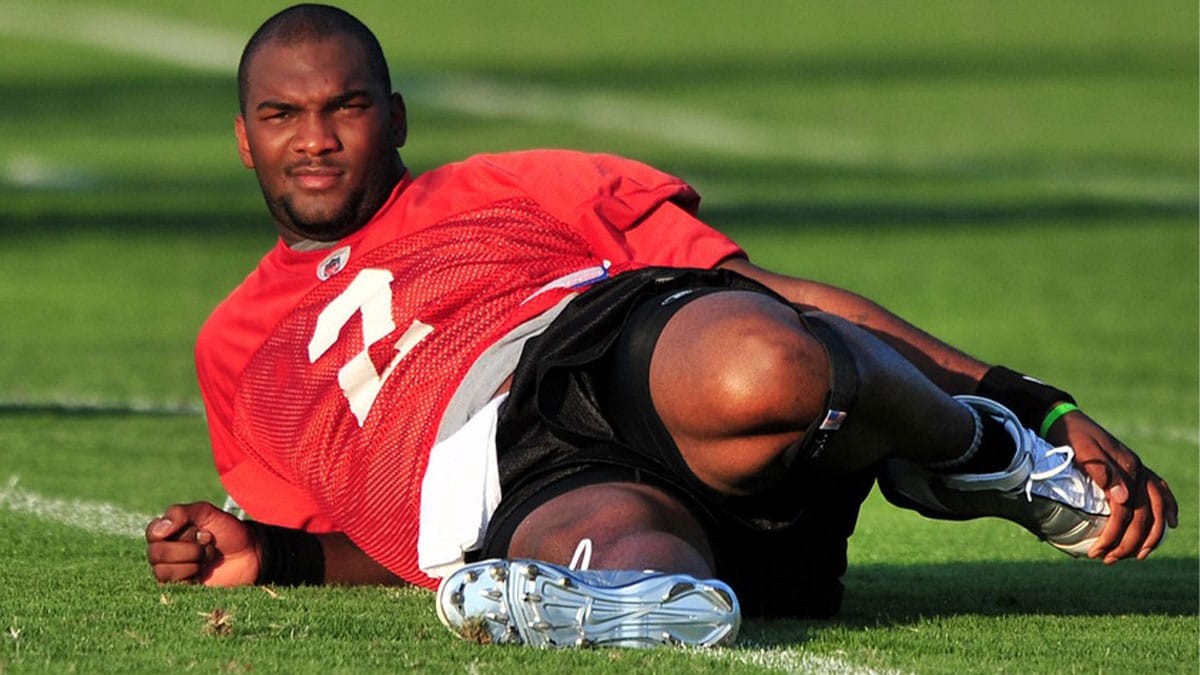
JaMarcus Russell is the biggest bust in NFL history. Russell had plenty of raw traits, but his lack of work ethic led to his downfall. The Raiders infamously gave their quarterback blank films to see if he watched tape, and he even reported to camp at nearly 300 pounds one season.
Russell was out of the league after three seasons, and he only recorded 4,083 passing during that time. To add insult to injury, Russell’s contract with the team was worth $68 million over six years. The only positive to come out of Russell’s career was that he was a big reason why the NFL added rookie wage scales for drafted players.
57. Ki-Jana Carter, RB: Cincinnati Bengals, 1995
A number of comeback attempts led to Ki-Jana Carter playing seven NFL seasons and allowed him to avoid being the biggest NFL Draft bust of all time. He didn’t do much any any of those seasons, though, so he just trails Russell as the worst number one pick ever. Carter compiled only 1,144 yards on the ground in his career, and he only had 14 NFL starts to his name. His career was basically over before it started because shredded his knee on the third carry of his first preseason game. The talented running back was never the same after that injury.
56. Steve Emtman, DL: Indianapolis Colts, 1992
Including picks before the common draft era, the Colts are tied with the Rams for picking first overall the most times. That means a draft bust was bound to happen, and it happened to Indianapolis in 1992 when they took Steve Emtman. Injuries limited the defensive lineman to only 134 tackles and eight sacks in his career.
55. Tim Couch, QB: Cleveland Browns, 1999
The Cleveland Browns are notorious for being bad drafters. That was most evident around the turn of the century, when Cleveland had the number one pick in back-to-back seasons, and both of those picks busted.
Couch was the more painful of the two picks, as his failure led to 40 different players starting a game under center for the Browns since they returned to the NFL in 1999. His 59 starts with the team are actually tied for the most of any Browns quarterback during that time, and he did show positive flashes on the football field. Injuries were his downfall, though, and they led to the number one pick only playing five seasons.
54. Courtney Brown, DE: Cleveland Browns, 2000
After taking Couch in 1999, the Browns followed up with another NFL Draft bust in Courtney Brown. Like Couch, Brown only lasted five seasons in Cleveland, and he was out of the league after playing his sixth year in Denver. Also like Couch, injuries were Brown’s undoing. He was sapped of his athleticism and was only able to get 19 sacks over his career. Finding hidden gems late in the draft is important, but the Browns are the prime example used to show why nailing early picks is so important. It can be argued the Cleveland still hasn’t fully recovered as a franchise from their draft mistakes over 25 years ago.
53. Bryce Young, QB: Carolina Panthers, 2023
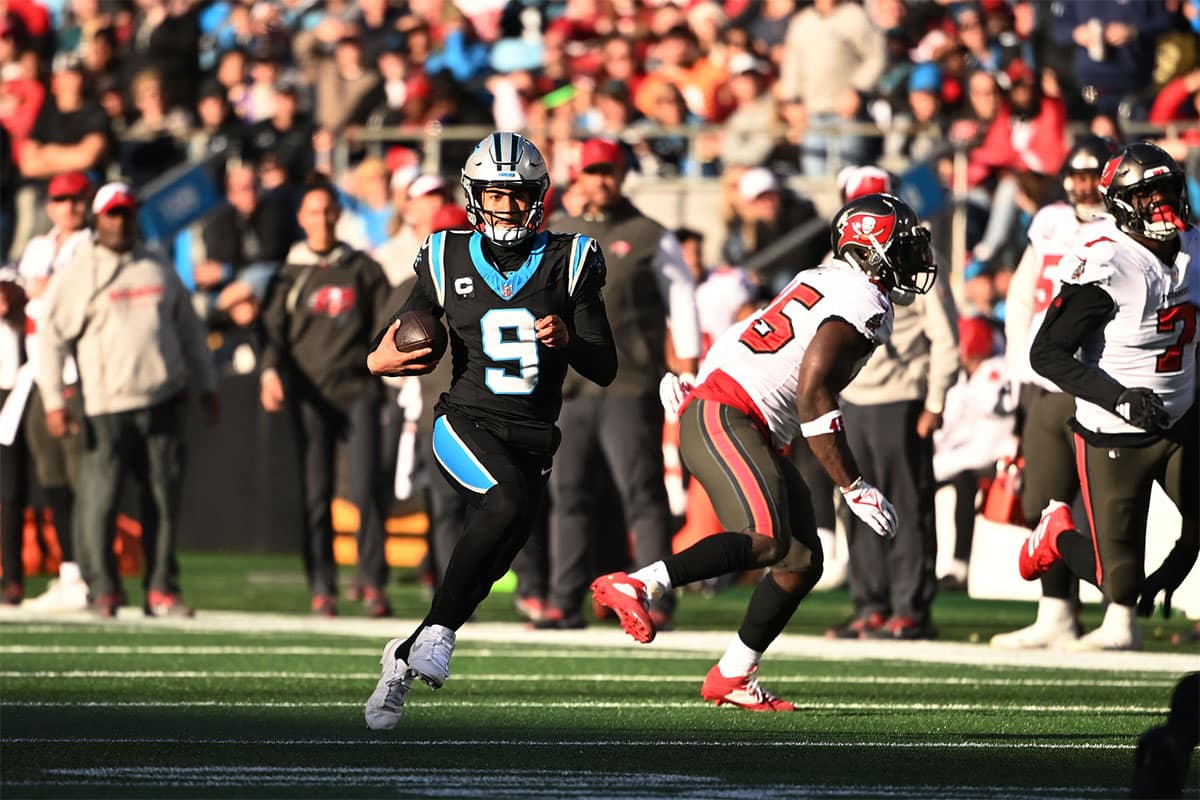
Bryce Young looked like one of the biggest draft busts ever – and certainly one of the biggest of the last 10 years – only a couple of games into his second season. The 2021 Heisman Trophy winner had a disastrous rookie campaign and was significantly outplayed by the quarterback selected after him. Meanwhile, C.J. Stroud had one of the best rookie seasons ever.
Young was then benched in favor of Andy Dalton after only two games in year two, which made it seem like the Carolina Panthers were giving up on him because of a poor frame, bad football IQ, and a lack of arm strength. Young had fewer than four yards per dropback in four straight starts, and the 84 yards he threw for in Week 2 were the fewest in franchise history for someone with 25 passing attempts or more.
There were almost no flashes of brilliance with Young under center, which led to few believing that he could turn things around. When Young was reinstated as the starter, though, he started to do just that. Young closed out his 2024 season with seven touchdown passes in his final three games, so there might be a great first overall pick somewhere in there ready to break loose.
52. Caleb Williams, QB: Chicago Bears, 2024
The year after Young was drafted, the Chicago Bears took Williams with a number one pick that they received from trading the pick that would become Young the year prior. Williams was a much more highly-touted prospect than Young, so the Panthers surely regret that decision.
However, Williams wasn’t as dominant as expected in year one. It is fair to say that he was over-criticized, though. Williams certainly had some bad games and still needs to adjust to the professional game, especially when it comes to holding onto the football for too long, but his numbers weren’t that bad for a rookie.
He broke the Bears rookie records for completions (351), yards (3,541), and touchdowns (20). Williams also threw 354 straight passes without an interception. That was not only a rookie record, but it was the fourth best mark for every quarterback in league history. Williams is expected to do so much more, though, as he still has the potential to become one of the best quarterbacks in the NFL.
51. Kenneth Sims, DE: New England Patriots, 1982
Kenneth Sims was yet another number-one pick who dealt with injury issues throughout his career. He did play eight years in New England, but he only got to the quarterback 17 times.
50. Walt Patulski, DE: Buffalo Bills, 1972
Walt Patulski was good but not great early in his career. He led his team in sacks as a rookie while showing tons of promise. Patulski was able to get 21.5 sacks just four years into his career, but he suffered a career-ending injury and retired after only five seasons. Patulski was likely never going to be one of the best first-overall picks ever, but he was on pace to rank higher than this if it wasn’t for his early retirement.
49. Travon Walker, DE: Jacksonville Jaguars, 2022
Walker ranks ahead of Young on this list because he did drastically pick things up in years two and three after a disappointing rookie season. Walker secured 10 sacks in year two and had 10.5 last season, and he will be viewed as a productive NFL player if he is able to improve on that this season. Still, Walker has been one of the least talked about top picks ever. It was a big surprise when the Jaguars took him at the top of the NFL Draft in 2022, and Walker hasn’t done enough to become a household name like most number one picks are.
48. Aundray Bruce, LB: Atlanta Falcons, 1988
Aundray Bruce was supposed to be the next big edge rusher, and he looked the part early in his career. He had six sacks in each of his first two seasons, but he never took the next step. Bruce settled into a role as a situational pass rusher, which is far from what the expectations were when he was made the number one overall pick.
47. David Carr, QB: Houston Texans, 2002
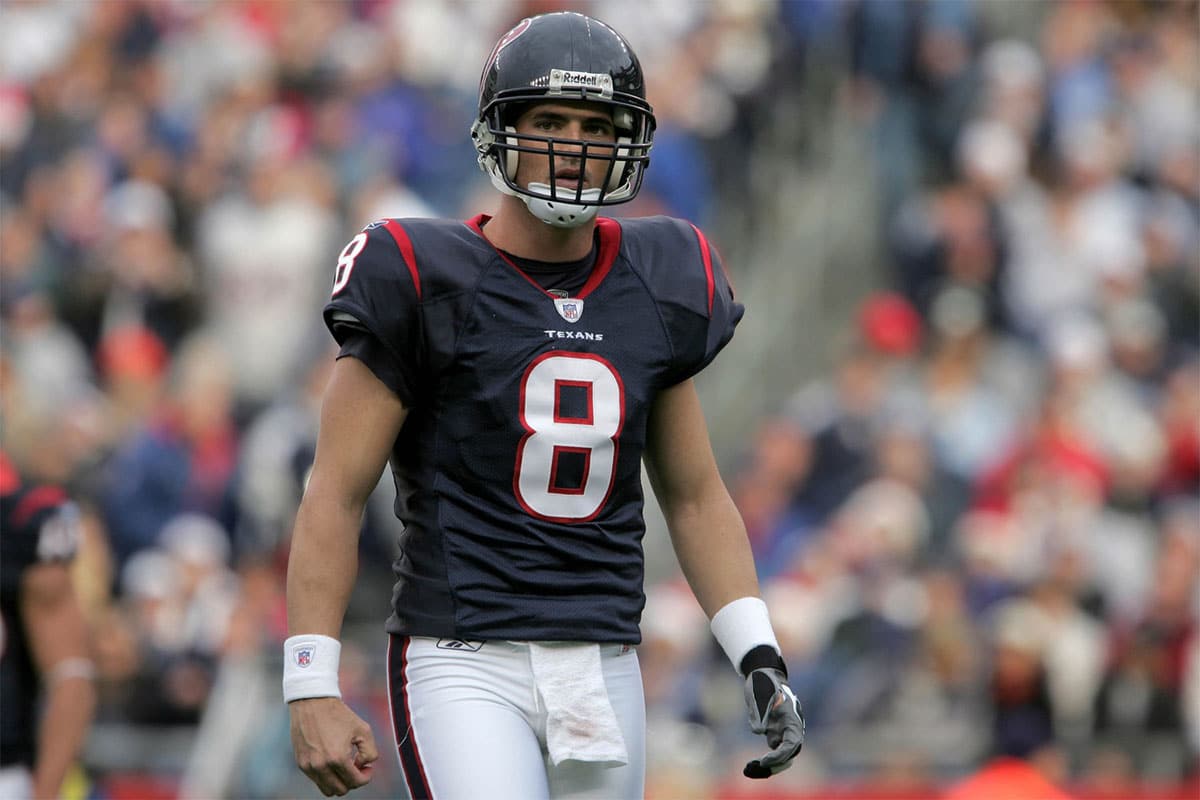
David Carr didn’t have it easy in the NFL. The Texans were the league’s newest expansion team in 2002, and they were awarded the top pick in that year’s NFL Draft. The expansion franchise didn’t have many good players early on, and it made life miserable for Carr.
He was sacked a record 76 times as a rookie, which is a record that still stands. While Carr did hold onto the ball too long, he didn’t have an offensive line that was able to give him sufficient time to make reads down the field. Carr’s third season in the league was okay. He had 3,531 passing yards and 16 touchdowns that season, but those are underwhelming numbers for what was by far his best season. Carr spent the back half of his career as a backup.
46. Tom Cousineau, LB: Buffalo Bills, 1979
Tom Cousineau had all of the potential to be an elite number one pick, but in the three years directly following being selected first overall, he played in the Canadian Football League. His delayed start in the NFL took away what could have been some great years, but Cousineau was still great when he finally did reach football’s top league. He led the Browns – whom he was traded to after committing to the NFL – in tackles in three of his four seasons with the team.
45. Eric Fischer, OT: Kansas City Chiefs, 2013
Eric Fisher was a consistently solid offensive lineman during his time with the Kansas City Chiefs, but he was never an elite starter, and that is what you expect when you take a tackle first overall. Fisher was twice named a Pro Bowler, but you would also prefer a number one lineman to play at least a decade, and Fisher didn’t do that, either.
44. Sam Bradford, QB: St. Louis Cardinals, 2010
Sam Bradford is one of the harder players to rank on this list, and he is probably lower here than on a lot of other outlets. On one hand, he developed into a high-accuracy quarterback, but that didn’t happen until later in his career and was largely a product of a dink-and-dunk offense that lacked big-time plays.
Bradford also dealt with injuries throughout his career that limited his production. He wasn’t a bad quarterback, but he definitely wasn’t number one pick quality.
43. Ricky Bell, RB: Tampa Bay Buccaneers, 1977
Ricky Bell’s story is a tragic one. He was a talented back and had some big moments in the NFL. Notably, Bell had 142 yards and two touchdowns in Tampa Bay’s first-ever playoff victory. However, medical issues cut Bell’s career short.
Aching muscles, weight loss, and skin issues caused by dermatomyositis forced the running back to retire by 1982, and he tragically passed away because of heart failure only two years later.
42. Russell Maryland, DT: Dallas Cowboys, 1991
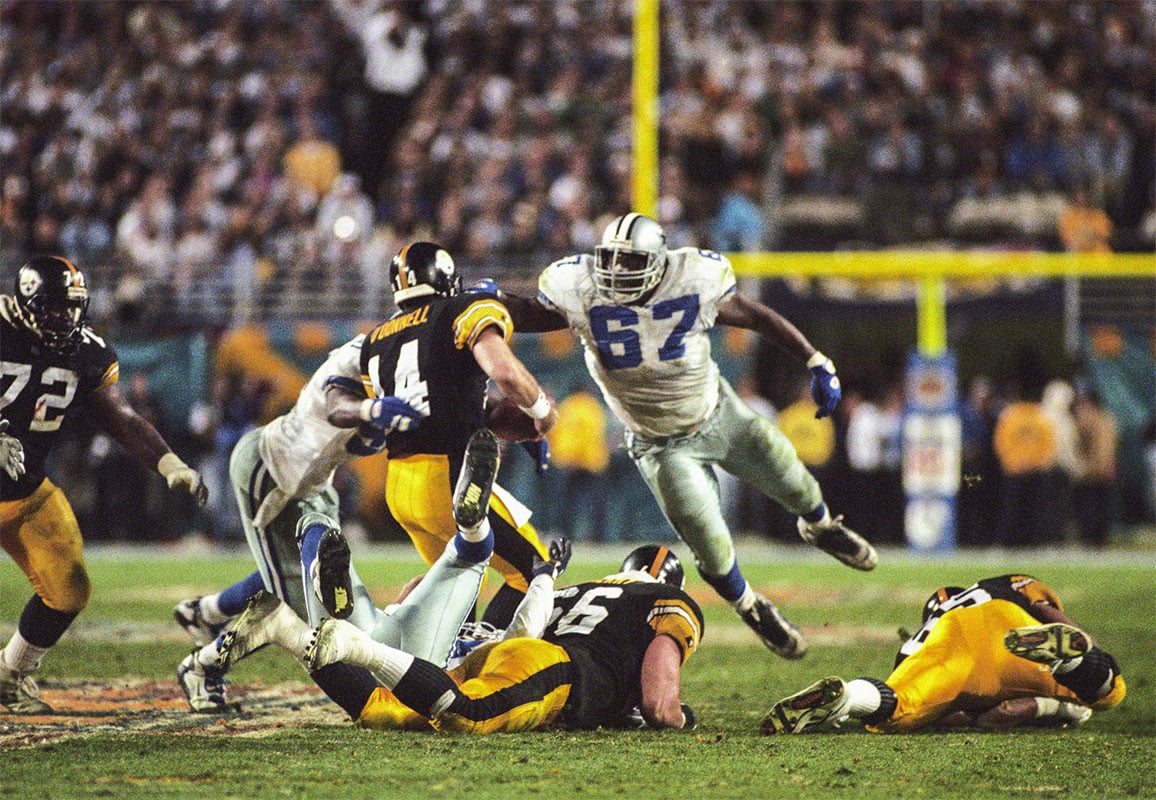
Russell Maryland joined the Cowboys just in time to help them become a dynasty. Maryland was just an okay player, as he was only selected to one Pro Bowl. He did win three Super Bowls along the way, though.
41. John Matuszak, DE: Houston Oilers, 1973
John Matuszak’s acting career stands out more than his playing career, but he did have some solid years in the NFL. His prime was over his first two seasons with the Raiders, where he had 18.5 sacks over that two year stretch. Outside of that, he was a pretty average player.
40. Kyler Murray, QB: Arizona Cardinals, 2019
The next four players on this list are all in the same boat. They are all recent number one picks who play quarterback and still have something to prove. Murray’s future outlook isn’t as bright as Trevor Lawrence’s, and he hasn’t done as much in the league as Baker Mayfield, so he ranks behind both players.
Murray future as Arizona’s quarterback going forward has often been somewhat in doubt throughout his career. He has the creativity to be an elite quarterback in the NFL, but he needs to put things together on a more consistent basis.
39. Trevor Lawrence, QB: Jacksonville Jaguars, 2021
Trevor Lawrence has been solid since being drafted with the first pick in 2021, but it is fair to say that he has disappointed in comparison to the massive expectations that were set on him as a prospect. Still, Lawrence has a case as an above average quarterback in the league, as he has surpassed 4,000 passing yards in two consecutive seasons before being limited by injury last year. Opinions soured on Lawrence in a big way after year four, though.
38. Jameis Winston, QB: Tampa Bay Buccaneers, 2015
Unlike the two quarterbacks behind him in this list, Jameis Winston’s best days are likely in the rearview. Winston started his career as an entertaining but streaky quarterback with the Buccaneers. He could put up big numbers because of his great deep ball, but his football IQ wasn’t great, and it led to a lot of interceptions. That was even on display as recently as last season with the Browns. Winston had 497 yards and four touchdowns in a game against the Denver Broncos, but he also threw three boneheaded interceptions and lost the game.
Winston has now settled into a role as one of the best backup quarterbacks in football, meaning the two quarterbacks behind him on this list have a chance of surpassing him in the near future.
37. Baker Mayfield, QB: Cleveland Browns, 2018
Baker Mayfield is a high-energy player who wants to win more than anything. He lacks a little bit of the talent that a team wants out of a number-one pick, though. His tenure in Cleveland had some electric moments. For example, Mayfield led to the Browns to the playoffs in 2020, which was the first time Cleveland made the postseason since 2002. Additionally, he helped the team get a playoff win, which was something that had not happened since 1994.
Mayfield’s numbers were somewhat mediocre, though, and the team traded him after only four seasons. He bounced around the league for a little bit but had a resurgence in 2023-24. Mayfield had his best season to date and earned a Pro Bowl nod by throwing for over 4,000 yards.
That season earned Mayfield a big deal with Tampa Bay, and he proved the Buccaneers’ commitemed correct with an even better season in 2024-25. Mayfield established himself as one of the best quarterbacks in the league with a 4,500-yard, 41-touchdown season. If he keeps it up, Mayfield can skyrocket up this list.
36. Jeff George, QB: Indianapolis Colts, 1990
Jeff George was a very talented quarterback. However, he played on seven different teams during his NFL career because his personality tended to create conflicts with coaches and management. That prevented George from ever becoming a true franchise quarterback. Still, George led multiple different teams to the playoffs and even led the league in passing yards in 1997.
35. Jadeveon Clowney, DE: Houston Texans, 2014
Jadeveon Clowney didn’t live up to the massive expectations that were set for him when the Texans took him first overall. He has still had a long and productive NFL career, though. Clowney has 58 sacks in his career, but he has become a journeyman of sorts. Clowney is now on his sixth team, but he is reliable wherever he goes.
34. Dan Wilkinson, DT: Cincinnati Bengals, 1994
Dan Wilkinson was far from the Bengals’ worst pick in the ’90s, but he certainly didn’t live up to expectations. He was still a solid, starting-caliber defensive tackle for the 13 seasons that he played in, and he did secure 54.5 sacks during his career. Fans always wanted more, though.
33. Steve Bartkowski, QB: Atlanta Falcons, 1975
The beginning and end of Steve Bartkowski’s career was marked by injuries, but he was a really good quarterback during his prime. Most notably, he threw 61 touchdowns over a two year span at the start of the ’80s.
32. Jake Long, OT: Miami Dolphins, 2008
Before injuries got the best of him, Jake Long was one of the best offensive tackles in football. After Pro Bowl and All-Pro selections early in his career, Long lost a step, and he started to hop from team to team. In his prime, he was an elite blindside protector who thrived in both pass protection and run blocking.
31. Billy Sims, RB: Detroit Lions, 1980
Billy Sims was fantastic when he was on the field, but he was another victim of injuries. He only played five seasons in the NFL, and only three of those saw him on the field for at least 12 games.
He surpassed 1,000 yards in those three seasons, and he even had 13 rushing touchdowns in each of his first two years in the league. Sims didn’t have the longevity to rank higher on this list, but he was a heck of a football player.
30. Bo Jackson, RB: Tampa Bay Buccaneers, 1986
Bo Jackson is one of the most famous first-overall picks ever, but his career in totality might not be as impressive as you might remember. Jackson’s NFL career was only four seasons long, and he never played more than 11 games in a season. He never even rushed for 1,000 yards, nor did he have more than five rushing touchdowns in a season.
Still, Jackson was one of the most dominant players in the league when he was on the field. His speed/power combination made him nearly impossible to bring down, and he went down as one of the best pure athletes in NFL history.
Jackson was a weird case, as he didn’t play for Tampa Bay after they made him the top choice. Instead, he played his football for a Raiders team that took him in the following year’s draft and allowed him to split time between football and MLB. His legacy as a two-sport athlete will never be forgotten, but his NFL career was somewhat averaged compared to his peers because of the lack of time he actually spent on the turf.
29. Joe Burrow, QB: Cincinnati Bengals, 2020
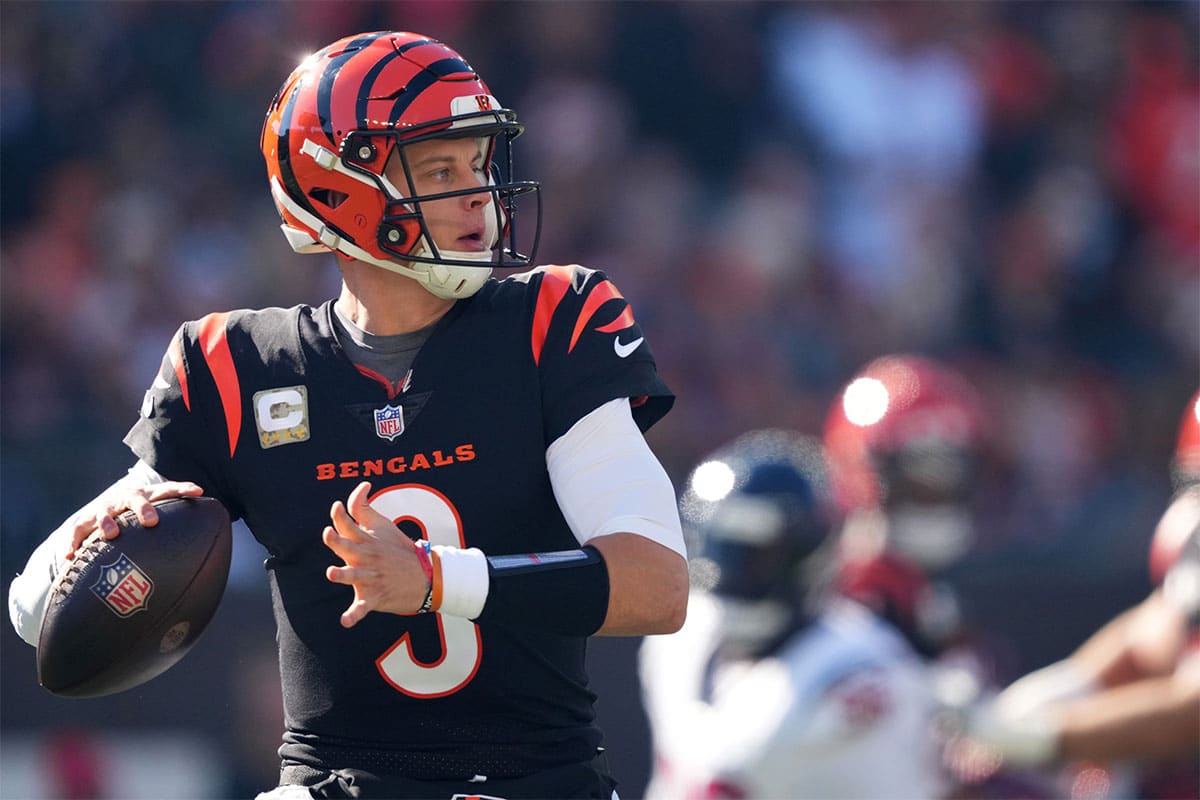
Joe Burrow ranks higher than every other first-overall pick from the last six NFL Drafts because he is already a clear star. Burrow’s injuries during his first and fourth seasons limit his placement on this list, but the young quarterback already has a case as the best quarterback in the league who is not named Patrick Mahomes.
Burrow surpassed 4,000 yards and 34 touchdowns in each of his fully healthy seasons, and he already led the Bengals to one Super Bowl appearance. Last season saw Burrow lead the NFL in yards (4,918) and touchdowns (43). Much more is yet to come from the 28-year-old.
28. Jared Goff, QB: Los Angeles Rams, 2016
Jared Goff has always been underrated during his career, and people are finally starting to come to terms with his greatness now that he is leading a high-octane offense with the Detroit Lions. Goff’s success started early in his career with the Rams, though. Goff earned a Pro Bowl nod in two of his first three seasons in the league, and he led Los Angeles to a Super Bowl appearance in year three.
Goff put up impressive numbers in Los Angeles, but the Rams wanted an upgrade and traded for Matthew Stafford. The quarterback has only improved since joining Detroit, and there are a number of number-one picks he will pass on this list sooner rather than later.
27. Bubba Smith, DE: Baltimore Colts, 1967
Bubba Smith was the first number-one pick in the Common Draft era. As is the case with a fair share of the first overall selections on this list, it was injuries that held Smith back. When he was healthy, he was a force to be reckoned with, and that was evident in his first few seasons in the league.
Smith earned two All-Pro selections, two Pro Bowl nods, and won a Super Bowl within his first five seasons in the league. Then, he missed the entire 1972 season with a knee injury, and he never returned to form.
26. Mario Williams, DE: Houston Texans, 2006
Many experts thought that Reggie Bush should have been the top pick in 2006, but Mario Williams ended up being the better choice. Williams added up 97.5 sacks and five All-Pro nods to his resume during his 11-year career.
25. Alex Smith, QB: San Francisco 49ers, 2005
Alex Smith was the ultimate game manager, and you usually want a little more out of a number-one pick. Still, Smith’s career was long and productive enough to warrant a spot in the top 25 for all-time top draft picks.
24. Keyshawn Johnson, WR: New York Jets, 1996
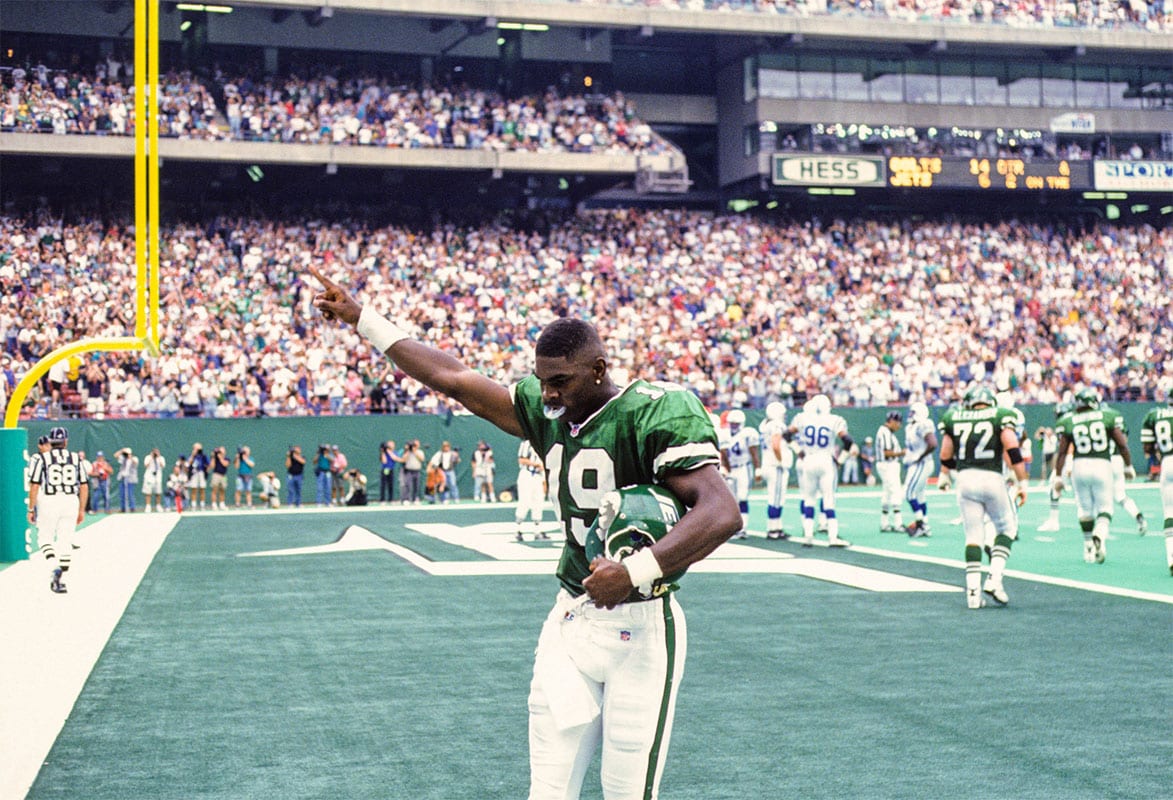
Keyshawn Johnson may have been a big prime donna, but he was also a very talented pass catcher. He surpassed 1,000 receiving yards four times and even caught 106 balls in 2001. Johnson may have thought he was better than he actually was, but he was, in fact, very good.
23. Irving Fryar, WR: New England Patriots, 1984
Only two receivers have gone first overall in the Common Draft era, and they rank back-to-back on this list. It took Fryar a while to get going in the NFL, as his stats in the ’80s are underwhelming, but he played long enough that he outranks Keyshawn Johnson here. Fryar played until he was 38 years old, and that allowed him to rack up 12,785 receiving yards, the 22nd most ever.
22. Andrew Luck, QB: Indianapolis Colts, 2012
Andrew Luck had one of the biggest “what if” careers in NFL history. He was viewed as one of the best prospects ever and quickly took over the league. However, he retired at the age of just 29 after seven seasons in the NFL.
In that little time, Luck managed to put up 23,000 yards and 171 touchdowns through the air. He seemed destined for greatness, but he prioritized staying healthy and retiring from the league, as he was heavily sacked during his time in Indianapolis.
21. Jim Plunkett, QB: New England Patriots, 1971
Jim Plunkett wasn’t necessarily an elite quarterback, but he won two Super Bowls and was the Super Bowl MVP one of those times. That alone makes for an impressive resume and lands Plunkett in the top 25 best number-one picks ever.
Plunkett put up solid numbers with the Patriots, but he won his championships with the Raiders. He initially served as a backup for the Raiders before becoming the man to lead them to championship glory.
20. Vinny Testaverde, QB: Tampa Bay Buccaneers, 1987
Vinny Testaverde was given lofty expectations when he was drafted first overall. He might not have become the megastar he was supposed to be, but his resume is impressive. Testaverde played until he was 44 years old and threw for 46,233 yards and 275 touchdowns during that span. He had stints on eight different teams, but he found varying levels of success with each of them.
19. George Rogers, RB: New Orleans Saints, 1981
George Rogers immediately lived up to the billing of being a number one pick by setting a then record for rookie rushing yards (1,674). That mark still ranks second all-time, but Rogers’ career didn’t end there. Five years later he had 18 rushing touchdowns, and he eventually won a Super Bowl with Washington.
18. Michael Vick, QB: Atlanta Falcons, 2001
Michael Vick is the best rushing quarterback ever and one of the most influential players in changing the game of football. Vick’s 6,109 yards on the ground and seven yards per carry are both the best marks ever for a quarterback.
The Falcons draftee was a highlight waiting to happen, and his talent on the ground makes people forget how impressive he was as a thrower as well. Vick’s arm strength was incredible, and he threw a pretty ball with a perfect spiral. He quickly became a star in the NFL, and he was headed toward legend status.
Unfortunately, Vick lost his prime when he was arrested for dog fighting. He did have an incredible comeback after returning to the NFL, but he was never able to live up to his fullest potential because of the time he spent in jail.
17. Drew Bledsoe, QB: New England Patriots, 1993
Drew Bledsoe is perhaps most known for being replaced by Tom Brady, but he did have a solid career in his own right. Bledsoe passed for 44,611 yards and 251 touchdowns during his career. One of his four Pro Bowl appearances even came after Brady became the Patriots starter.
16. Myles Garrett, DE: Cleveland Browns, 2017
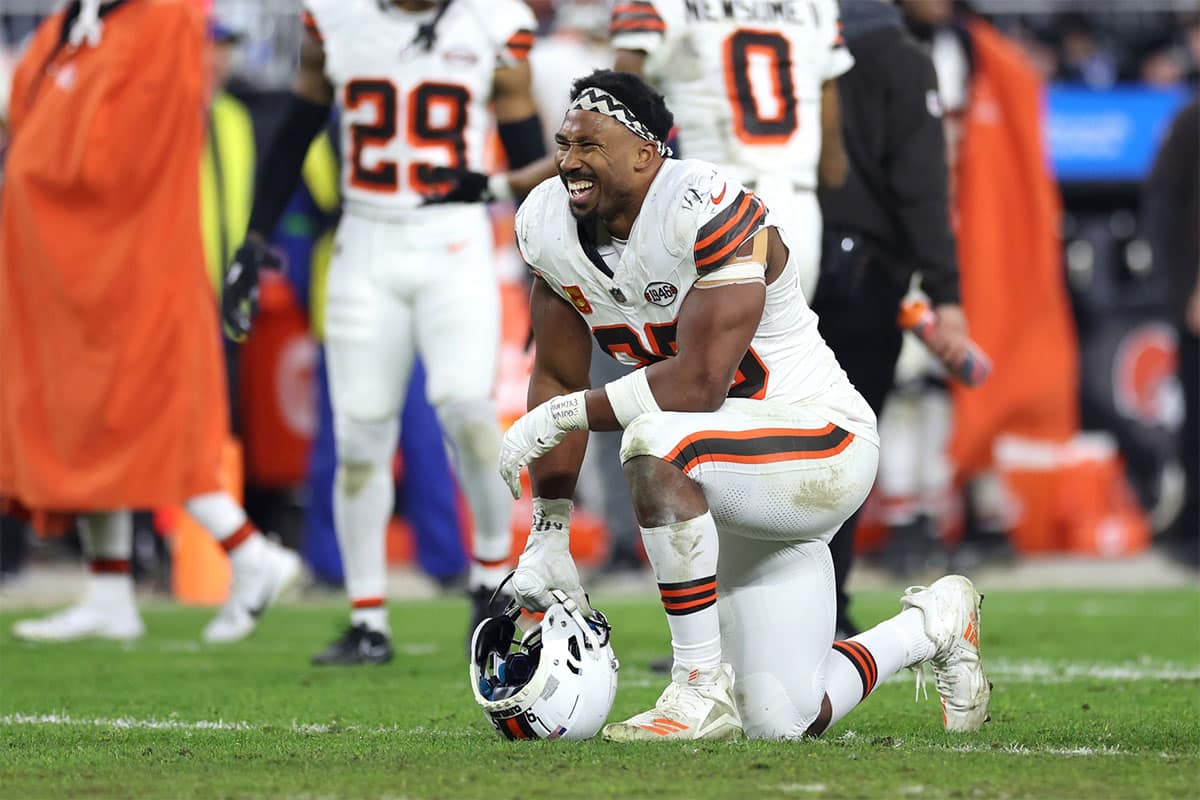
Myles Garrett is the best number one pick over the last decade. He was a rare hit at the top of the NFL Draft for the Browns. Garrett is a five-time All-Pro and finally earned a much-deserved Defensive Player of the Year two seasons ago. Garrett still has a lot of good years ahead of him, too, meaning he will likely rank much higher on this list when it is all said and done. As of now, he is one of the best active NFL players.
15. Cam Newton, QB: Carolina Panthers, 2011
Cam Newton was a quarterback in a defensive lineman’s body. He was massive, and although it led to defenders hitting him hard, it also led to him becoming one of the best rushing quarterbacks ever. Instead of avoiding defensive players, he ran through them.
Newton also had an incredible arm. Newton’s 2015-16 season was special. His Panthers offense was potent, and Newton’s “dab” and “Superman” celebrations became global sensations. Unfortunately, the Panthers lost to the Denver Broncos in the Super Bowl that year, but not until after the quarterback secured the MVP award.
14. Ron Yary, OT: Minnesota Vikings, 1968
Only 10 first overall picks drafted in the common draft era have been elected to the Hall of Fame. Yary is one of them. Yary was so talented at protecting the quarterback that he became the first offensive lineman ever drafted number one. He lived up to the selection with a magnificent career that included seven Pro Bowl nods.
13. Ed Jones, DE: Dallas Cowboys, 1974
Ed Jones, nicknamed Too Tall, was a mountain of a man. Jones wasn’t heavily scouted for a top pick, but his physical traits were too much to pass on for the Cowboys. Jones’ ability to get after the quarterback led to 106 career sacks, and even when he didn’t pressure the quarterback, his size made him a threat to get swats at the line of scrimmage.
12. Carson Palmer, QB: Cincinnati Bengals, 2003
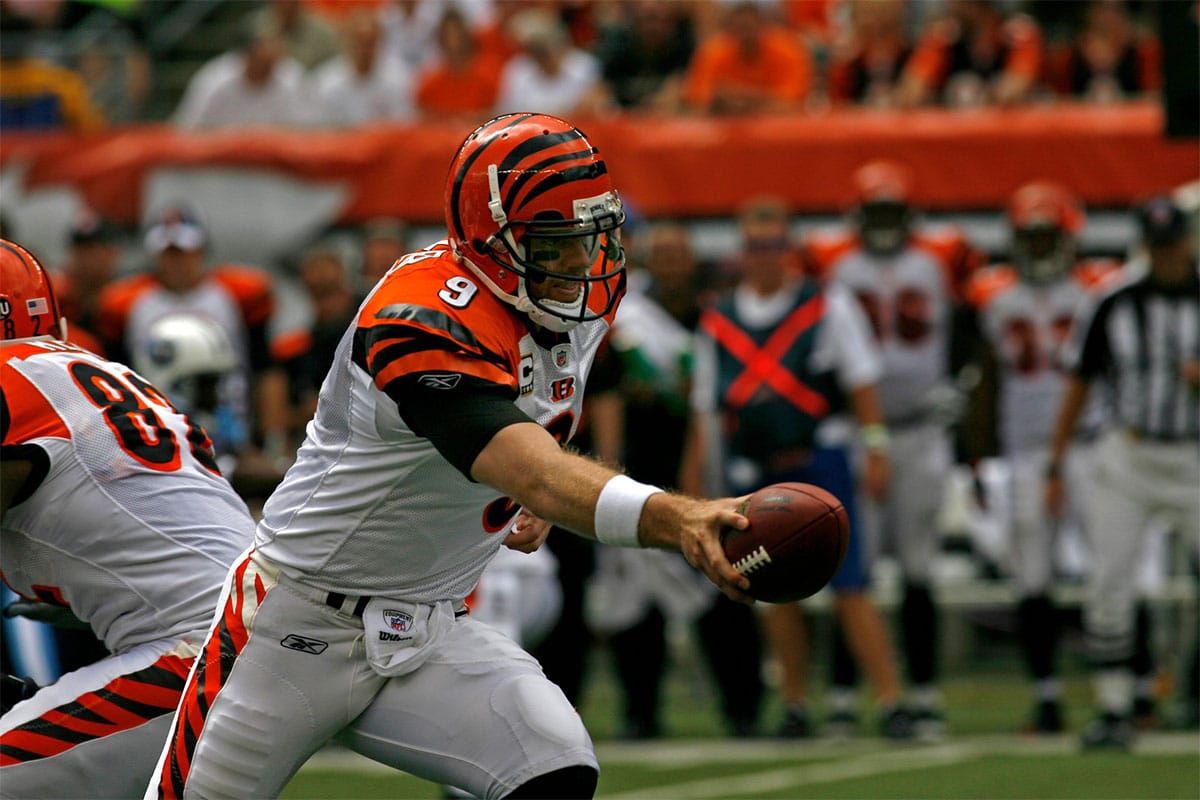
Carson Palmer is one of the most underrated players in NFL history. Although he wasn’t usually a top-five quarterback in the league, and he never won a championship, he was consistently a top-10ish player at his position, and he succeeded for a long time.
Palmer threw for 46,247 yards and 294 touchdowns during his career, both of which rank 15th all-time. His longevity is amongst the best ever, and Palmer was a Super Bowl away from reaching legend status.
11. Lee Roy Selmon, DE: Tampa Bay Buccaneers, 1976
Lee Roy Selmon was Tampa Bay’s first superstar. He made six straight Pro Bowl appearances and is now a Hall of Famer. Selmon played with ferocious intensity when it came to getting after the quarterback and stopping the run.
10. Orlando Pace, OT: St. Louis Rams, 1997
Orlando Pace is not as well known as the other number one picks in the top 10 of this list, but his placement is more than warranted. Many consider Pace to be the greatest offensive lineman of all time. He made seven Pro Bowls while protecting his quarterback’s blindspot, and he did it in an era where the Rams had one of the best offenses in league history.
9. Matthew Stafford, QB: Detroit Lions, 2009
Matthew Stafford played on some bad Lions teams early in his career, but he was never the problem. With Calvin Johnson lined up outside, Stafford was one-half of one of the best quarterback-receiver pairings this century. He was able to put up massive numbers with Megatron catching his passes.
He hit 40,000 career yards quicker than anyone else in history, and he ranks top 12 all-time in passing yards, (59,809), passing touchdowns (377), and completions (5,174). Stafford even has one of the 15 5,000-yard seasons in league history to his name. After putting up monster numbers in Detroit, Stafford was finally able to lead his team to championship glory after being traded to the Rams.
8. Eli Manning, QB: San Diego Chargers, 2004
Eli Manning followed in the footsteps of John Elway and immediately requested a trade out of the organization that took him number one. Like Elway, Manning also had a magnificent career after being moved to a team that better fit him. Manning is responsible for some of the best Super Bowl games and biggest Super Bowl moments in history, as he twice beat the Patriots dynasty in dramatic fashion in the biggest game.
Eli and his brother Peyton were both drafted first overall. Two family members both making the same league together is impressive enough, but both being so talented that they are taken with the top pick is unfathomable.
7. Earl Campbell, RB: Houston Oilers, 1978
Some running backs rely on speed, but Earl Campbell relied on power and strength. He ran through opposing defensive players en route to 9,407 career rushing yards and 74 rushing touchdowns. The running back will forever be remembered as the greatest Houston Oilers player ever.
6. O.J. Simpson, RB: Buffalo Bills, 1969
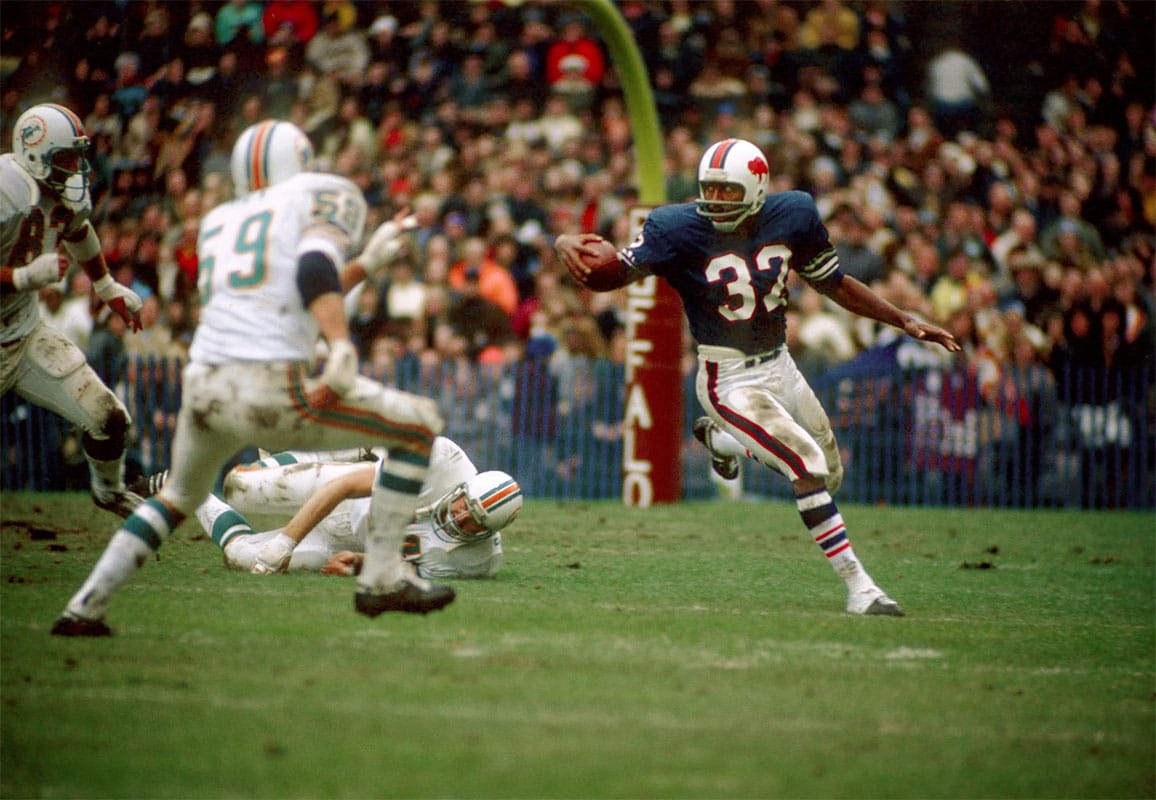
O.J. Simpson has stayed relevant long after his playing days, and his off-the-field drama makes people forget that he was once one of the best running backs ever. Simpson was a part of arguably the biggest trial in United States history, and he ended up seeing jail time for an unrelated crime.
Simpson’s recent passing was big news. Back in the ’70s, he was unstoppable on the gridiron. The running back led the NFL in rushing yards four times. During that span, he became the first of only nine backs to rush for 2,000 yards in a season.
5. Terry Bradshaw, QB: Pittsburgh Steelers, 1970
Terry Bradshaw is one of the best winners in NFL history. Bradshaw led the Steelers to becoming a dynasty, as they won four championships with him under center. His numbers don’t jump off the page, but that is just a product of his era. Bradshaw delivered massive plays in the biggest moments.
4. Troy Aikman, QB: Dallas Cowboys, 1989
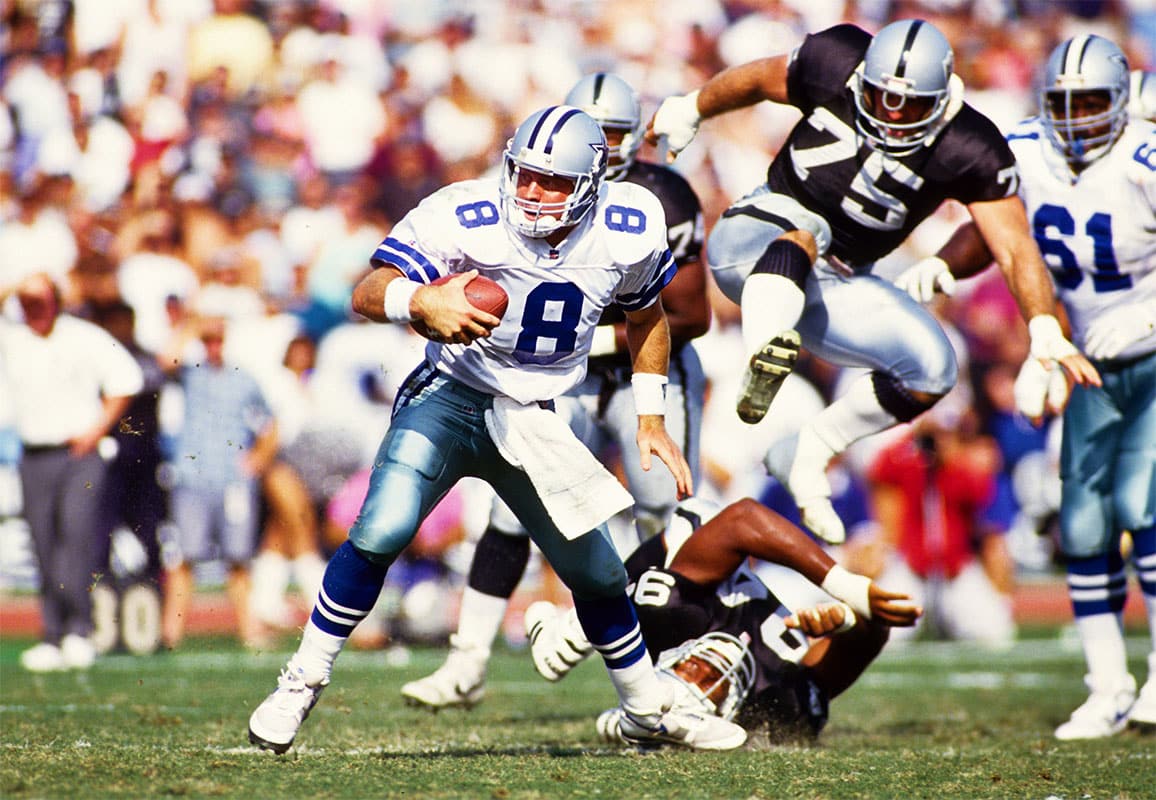
Troy Aikman was an incredibly accurate quarterback, and it led to three Super Bowl victories during the golden age of Cowboys football. Under the leadership of Aikman, America’s team knew how to win the most important football games, which is something that has become more of a rarity since his retirement.
3. Bruce Smith, DE: Buffalo Bills, 1985
If the quarterback position wasn’t so valuable, Bruce Smith would have a case as the best number one NFL Draft pick ever. Smith’s 200 sacks are the most ever, and he was a two-time Defensive Player of the Year.
Because the quarterback position is the most important in football, having someone who can make life hard on opposing signal-callers is the next most valuable thing. Smith made life miserable for opposing quarterbacks, and he is clearly one of the best sack artists in league history.
2. John Elway, QB: Baltimore Colts, 1983
Say what you want about the Colts, but they clearly know how to evaluate quarterbacks. Along with Jeff George, Andrew Luck, and Peyton Manning, the Colts selected John Elway with the first overall pick.
Of course, Elway never played for the Colts, who were in Baltimore at the time. Instead, the prize of the quarterback class of 1983 – arguably the best NFL Draft class ever – decided to threaten that he would play baseball if he was drafted by the Colts. Baltimore took him anyway, but they were forced to trade him to the Denver Broncos, and the rest is history.
Elway’s cannon of an arm and ability to use his legs made him one of the best physical freaks to ever play the quarterback position. It led to five Super Bowl appearances, two of which he won to end his career. A number one pick never playing a down for the team that drafted them isn’t ideal for said team, but there is no denying that Elway is one of the best NFL players ever, regardless of being drafted first overall.
1. Peyton Manning, QB: Indianapolis Colts, 1998
The expectation for number one overall picks is that you become a Hall of Famer, but becoming one of the clear-cut all-time greats is even better. While no one has a resume like Tom Brady, who was a sixth-round pick, there is no doubt that Manning is one of the best players ever.
Manning’s five MVP awards are the most in league history. He is also the all-time leader in 4,000-yard passing seasons (14), single-season passing yards (5,477), single-season passing touchdowns (55), and first-team All-Pro selections for a quarterback (seven). He is even third in career passing touchdowns (539) and career passing yards (71,940).
Manning’s tenure with the Colts was legendary, but his time with the Broncos is not to be forgotten either. His accuracy was unmatched during his Colts days, and he won with his brain on the Broncos.
More must-reads:
- Buccaneers' chances of upsetting Rams take massive hit due to illness in locker room
- Jalen Hurts responds to reports about Eagles' alleged frustrations with his play
- The 'NFL single-game completions leaders' quiz
Breaking News
Trending News
Customize Your Newsletter
 +
+
Get the latest news and rumors, customized to your favorite sports and teams. Emailed daily. Always free!
TODAY'S BEST

Packers Receive Disappointing Injury News Before Vikings Matchup
Jayden Reed’s anticipated return to the practice field for the Green Bay Packers will have to wait a little longer. Despite some growing hope earlier this week that the dynamic wide receiver could begin the next phase of his recovery, head coach Matt LaFleur confirmed Wednesday that Reed will not open his 21-day practice window yet. “He’s not practicing today,” LaFleur said ahead of Sunday’s critical matchup against the Minnesota Vikings. When pressed for a clearer timeline on the second-year standout, who remains on injured reserve with collarbone and foot injuries, LaFleur deferred to the medical staff. “I don’t know. As soon as medical clears him, he’ll be out there,” LaFleur said. “I know he’s excited to get back. As am I.” The optimism had spiked in recent days. On Monday, LaFleur indicated there was a chance Reed and/or rookie running back MarShawn Lloyd could start their practice windows this week. Reed himself fueled the excitement Tuesday by sharing a photo of himself dressed in full uniform on social media. Those plans, however, are now on hold. Reed’s surgically repaired foot seems to have healed satisfactorily, but the collarbone—fractured on a diving attempt during the first half of Green Bay’s Week 2 victory over the Washington Commanders—still needs additional time. For a wide receiver whose job involves regular physical contact and the risk of landing hard on the shoulder, the medical staff is requiring clear imaging evidence that the bone is strong enough before green-lighting a return. The cautious approach echoes the Packers’ handling of Aaron Rodgers’ similar collarbone injury in 2017, when the former quarterback sat out seven games while waiting for full healing. Nearly 10 weeks removed from the injury and having already missed eight contests, Reed could still require another one to two weeks before doctors are comfortable clearing him for football activities. That timeline keeps a potential return for the Thanksgiving night clash with the Detroit Lions or the following week against the Chicago Bears realistically in play. Before the injury, Reed had established himself as Green Bay’s top receiving weapon. He paced the team in receiving yards in both 2023 and 2024, and in the two games he played this season while managing the foot issue, he recorded three receptions for 45 yards and a touchdown. The Green Bay Packers will continue their Week 12 preparations without their leading wideout on the practice field, with LaFleur and the organization prioritizing full recovery over a rushed comeback.

Three teams getting too much credit from College Football Playoff committee
The College Football Playoff committee released its latest set of rankings on Tuesday night without too many surprises. Oklahoma was the biggest mover, going up to No. 8 after a road win over Alabama, which dropped to No. 10. The Crimson Tide are effectively holding onto the last playoff spot. Miami, the top-ranked ACC team, is projected to get that league's spot for now, while Tulane would get the last automatic berth, going to the fifth-highest-ranked conference champion. That leaves BYU and Utah on the outside looking in. Vanderbilt, USC, Georgia Tech and Michigan are some other teams looming. USC can make a statement this weekend, with a road win over Oregon. The Ducks are ranked seventh, while USC is 15th. For the Trojans, a win this week likely catapults them into the top 10. It could also expose a top-10 team that doesn't have the resume of a top-10 team. Three teams are being overvalued by the College Football Playoff committee, and the list starts with Oregon. Oregon (No. 7) The Ducks have beaten up on some weak opponents, but their best wins this season were an ugly victory at Iowa and a 20-point road win over Northwestern. They don't have a single win over a currently ranked team. Alabama has beaten two teams in the top 14 and four in the top 25. Oregon passes the eye test. But it feels like the Ducks are getting too much credit for a win at Penn State that's not all that impressive, and a close home loss to Indiana, something the Ducks share with Iowa. Oregon has looked great at times. It also looked unimpressive in a 21-7 win over 3-7 Wisconsin. Saturday's game will answer some questions, yet the Ducks are being overvalued by the committee. Tennessee (No. 20) Strength of schedule should matter, but not when the College Football Playoff committee is artificially pumping up the schedule strength of one conference in particular: the SEC. The five teams in the top 10 are worthy. It's hard to argue against them. But outside of that, the SEC feels propped up. Tennessee, for instance, hasn't beaten a single team with a winning record this season. Losing to Georgia in overtime and to Oklahoma by single digits isn't a good enough reason to be ranked. Missouri (No. 22) Like Tennessee, the best achievement of the Missouri Tigers has been losing to ranked teams. SMU, from the ACC, has a similar record. It has three losses to teams with winning records, plus a win over No. 13 Miami, a better win than Tennessee or Missouri, yet the Mustangs didn't crack the top 25. No. 23 Houston is 8-2. The Cougars lost to fifth-ranked Texas Tech earlier in the season, plus to West Virginia. They also beat 25th-ranked Arizona State on the road, yet are ranked behind two teams that haven't beaten a single team with a winning record. It feels like the College Football Playoff committee continues to favor the SEC, but it's about more than that. Too much is being based on the eye test. That's why Oregon is ranked where it's at and some SEC teams, too. The resume should matter above everything. Performance on the field should be the determining factor, but once again, that doesn't appear to be the case.
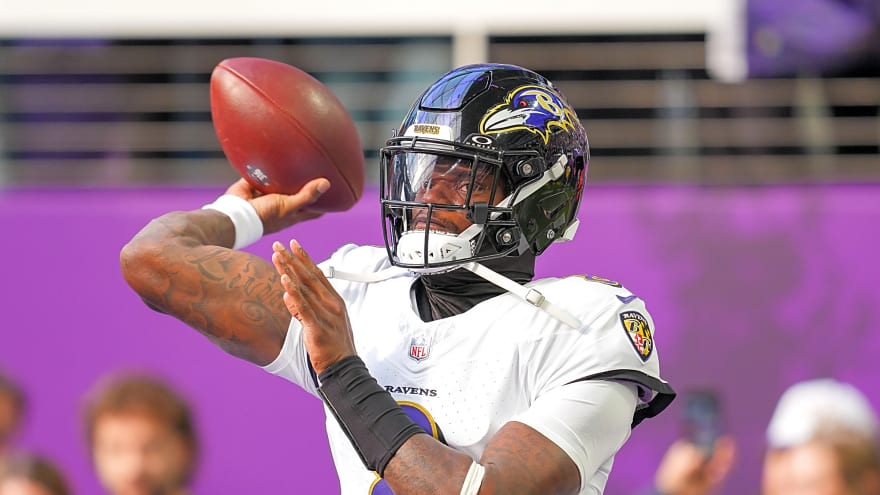
The Big Five: Most dangerous teams currently outside the playoff picture
With just a week until Thanksgiving, the NFL playoff picture is beginning to take shape. But seven weeks remain in the regular season, giving teams on the outside looking in time to turn things around. Below, we rank the five most dangerous teams currently not in the playoff field. 5. Houston Texans (5-5, eight in AFC) Remaining opponents stats | Record: 40-31 (.563) • Currently in playoff field: 4 • Above .500: 4 With a defense as good as Houston's, it can't be taken lightly despite a brutal remaining schedule. Over the Texans' final seven games, they only play two teams currently with a losing record — the Arizona Cardinals (3-7) and Las Vegas Raiders (2-8). With C.J. Stroud (concussion) out for Sunday's game against the Buffalo Bills (7-3), the team's hopes of remaining in contention will be even tougher. But Houston has won its past two games with Davis Mills at quarterback, thanks in large part to a defense allowing 221 yards per game. The Texans have the league's longest active streak of holding opponents under 200 passing yards (seven games), per Stathead research. In addition to the Bills, the Texans play the Indianapolis Colts (8-2) twice, Kansas City Chiefs (5-5) and Los Angeles Chargers (7-4), teams that can put up points. Houston, which is No. 21 in scoring offense (22 points per game), likely won't be able to keep pace in shootouts — even when Stroud returns — so it must lean on the defense to complete the long trek from 0-3 to the playoffs. 4. Dallas Cowboys (4-5-1, 10th in NFC) Remaining opponents stats | Record: 35-38 (.479) • Currently in playoff field: 2 • Above .500: 3 While we can't glean much from Dallas' convincing Monday night win over the directionless Raiders, it was still telling that the defense, a sore spot all season, kept an inept Las Vegas attack from having a season-best performance. Among the five teams listed here, the Cowboys have the easiest remaining strength of schedule, with more games against teams with losing records (three) than those in the playoff field (two). Their next three games — against the Philadelphia Eagles (8-2), Chiefs and Detroit Lions (6-4) — will inform how heavily Dallas factors into the playoff race through December. But for a team that seemingly had no hope following a Week 9 loss to the Cardinals, Dallas could be feistier down the stretch than most predicted. 3. Detroit Lions (6-4, eighth in NFC) Remaining opponents stats | Record: 37-32-2 (.521) • Currently in playoff field: 4 • Above .500: 4 Sunday's game against the New York Giants (2-9) is almost a must-win considering what lies ahead for Detroit. Over its final five games, it plays the Green Bay Packers (6-3-1), Los Angeles Rams (8-2), Pittsburgh Steelers (6-4) and Chicago Bears (7-3) plus the division-rival Minnesota Vikings (4-6). The Lions, who rank in the top five in total offense and defense, are more than capable of holding their own against stiff competition, although injures (particularly to the offensive line) have made them more vulnerable than the past two seasons, when they reached the NFC Championship Game (2023) and claimed the conference's No. 1 seed (2024). 2. Kansas City Chiefs (5-5, ninth in AFC) Remaining opponents stats | Record: 36-35-1 (.500) • Currently in playoff field: 3 • Above .500: 3 ESPN's Bill Barnwell recently laid out a convincing argument why this year's Chiefs squad isn't much different from last year's team that went 15-2. Other than a staggering regression in one-score games and special teams lapses, Kansas City is good enough to go on a run and crash the playoffs. The Chiefs' toughest remaining games (Colts, Chargers, Broncos) are at home. They also have a head-to-head with the Texans at Arrowhead. It's far too early to write Kansas City's obituary. The AFC West might be out of play, yet NFL Next Gen Stats still gives the Chiefs a 52 percent chance of making the playoffs. However, NFL.com's Ali Bhanpuri noted in a recently column that Kansas City's odds will drop to less than 33 percent with a loss this Sunday to Indianapolis. 1. Baltimore Ravens (5-5, 10th in AFC) Remaining opponents stats | Record: 35-35-1 (.493) • Currently in playoff field: 3 • Above .500: 4 The Ravens are just one game out of first in the AFC North and have the New York Jets (2-8) and Cincinnati Bengals (3-7) on the schedule before the first of two games with the division-leading Pittsburgh Steelers (6-4). By the end of the first weekend in December, Baltimore, which has won four in a row following a Week 7 bye, could easily be in pole position for a third straight AFC North title.
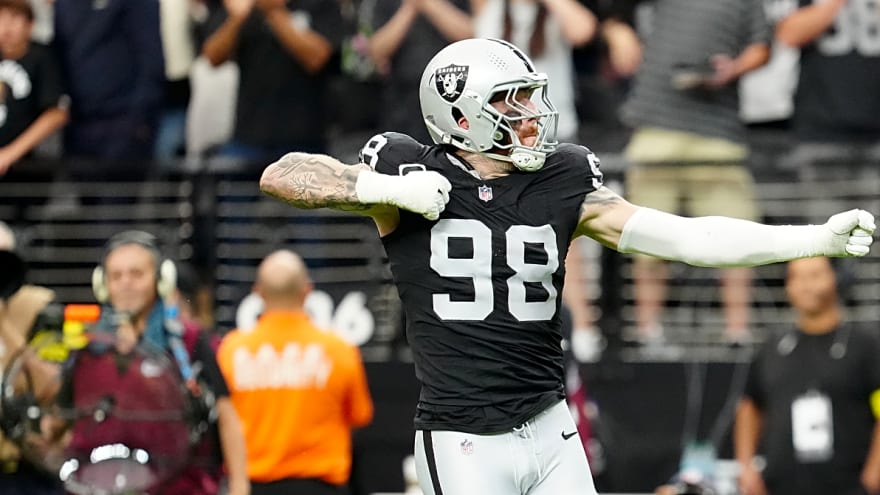
'We got to make his life miserable': Maxx Crosby discusses Shedeur Sanders' debut
Las Vegas Raiders defensive end Maxx Crosby clearly wants Shedeur Sanders to enjoy a successful career. Still, he's not going to take it easy on the Cleveland Browns rookie quarterback in his starting debut. On Wednesday, Browns head coach Kevin Stefanski confirmed Sanders is set to make his first start in Sunday's game against the Raiders in Las Vegas at 4:05 p.m. ET on CBS. Fellow rookie QB Dillon Gabriel is still battling a concussion suffered during a 23-16 loss to the Baltimore Ravens in Week 11. Crosby wants to make Sanders' day forgettable. It's nothing personal. The DE is just doing his job. Maxx Crosby discusses how he wants to wreck Shedeur Sanders-led Browns "Regardless, we have a job to get done and we got to make his life miserable," Crosby said Wednesday on his podcast, "The Rush with Maxx Crosby." "And we've got to shut down their offense for us to have a chance. "I'm going to watch the film, see what everything looks like, and take it one day at a time. But yeah, I got a ton of respect for obviously OG Deion [Sanders' father] and his whole family, they're great people, and it'll be fun. It'll be fun for [Shedeur] if he ends up being the guy." Sanders didn't look like a franchise QB when replacing an injured Gabriel in the second half of Cleveland's game against Baltimore. The former Colorado Buffaloes star completed 4-of-16 passes for 47 yards and tossed one interception. Week 11 was the first time Sanders had played with Cleveland's first-team offense. After working with the starters at practice this week, he's confident he'll play much better in Week 12. On Wednesday, Sanders told the media he believes he's "the guy" for Cleveland and that he'll let his play on Sunday prove it. Although the Raiders are 2-8, they could still provide a challenging test for the 23-year-old rookie. After 11 weeks, Crosby is tied for 16th in the league in sacks (six) and tied for eighth in forced fumbles (two). Cleveland, meanwhile, has allowed the second-most pressures (96) in the league, via Pro Football Reference. Sanders and the Browns (2-8) may surprise in his debut on Sunday. Even if he excels against Vegas, don't be surprised if Crosby sacks the QB at least one time. He's determined to give him his "welcome to the NFL" moment.







